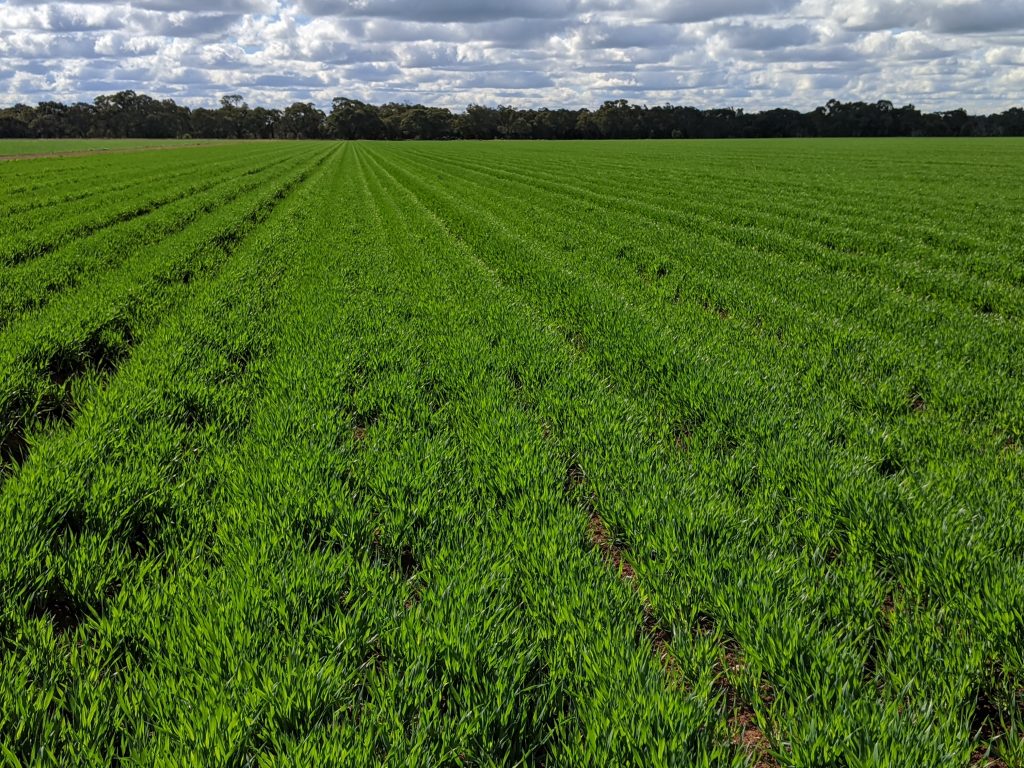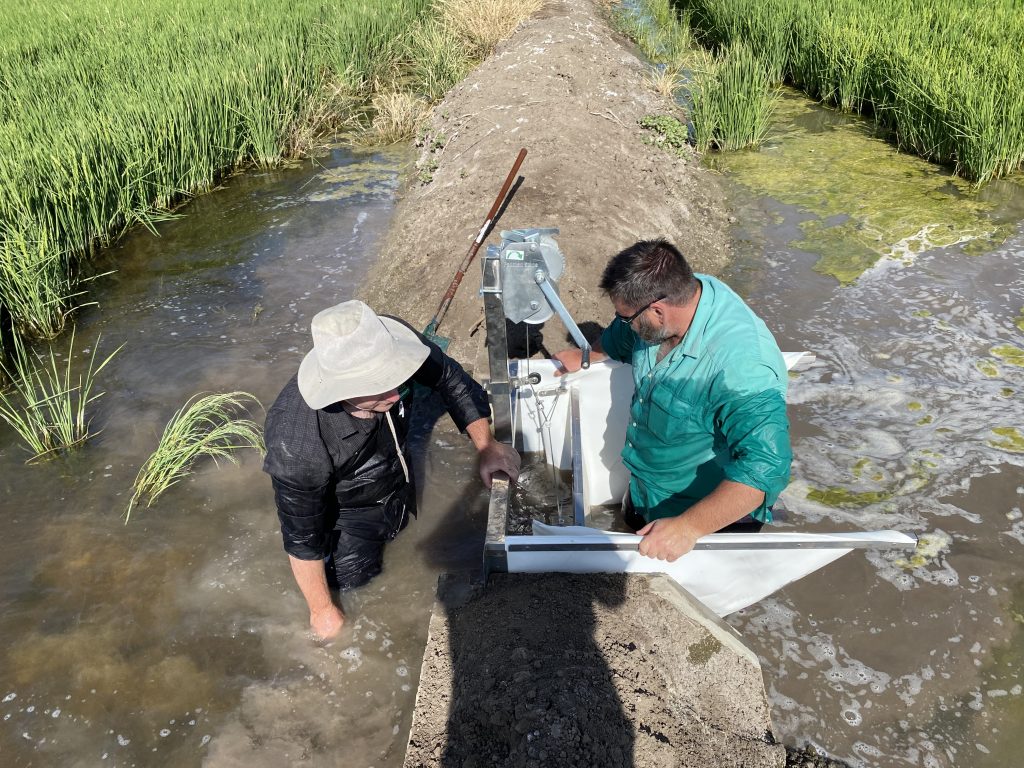PROJECTS AND RESEARCH
At IREC, we provide the gateway for researchers, agencies and growers to communicate and collaborate on issues that impact on irrigated farming systems and the industry in the Murrumbidgee Valley.
As an independent voice, IREC is able to present a coordinated response, inform and develop new ideas, and in turn, influence the progression of aligned research activities.
Please find below the research activities in which we are currently involved.
CURRENT RESEARCH
COOL SOIL INITIATIVE
IREC is a partner in the Cool Soil Initiative – a paddock to product partnership. The Cool Soil Initiative supports farmers in exploring their practices to improve the health of their soil, increase their yield, and reduce on-farm greenhouse gas emissions.
Our purpose is to enable a scientifically credible framework for the food industry to support farmers to make a healthier, sustainable future for our farming industry.
For more information on Cool Soils Initiative, visit the project page hosted by CSU https://www.csu.edu.au/cool-soil-initiative/home
To get involved contact IREC’s Project Officer, Sarah McCaskie.
Partners involved with the project include Allied Pinnacle, CWFS, FarmLink Research, Mars Petcare, Sustainable Food Lab, Kelloggs Australia, PepsiCo, Food Agility, Manildra Group, Riverine Plains and Corson Grain.
OPTIMISING IRRIGATED GRAINS
GRDC have invested in a suite of irrigation research in the Southern Irrigation Zones to provide relevant information to assist farmers. The projects include the development and validation of soil amelioration and agronomic practices to realise the genetic potential of grain crops grown under a high yield potential, irrigated environment in the southern and northern regions and optimising farm scale returns from irrigated grains: maximising dollar return per megalitre of water. The overall objective of the project is that by June 2023, 40% of irrigated grain growers in the Southern Murray Darling Basin have the knowledge, confidence and tools required to optimise farm scale returns through increased yield and allocation of water resources. To achieve this objective, irrigation discussion groups are part of the suite of new research.
Provisional Report FINAL
Provisional Report Soil Amelioration 2021
Provision Harvest Results Report – Durum Wheat 2021 | Chick Peas 2021 | Faba Beans 2021 | Canola 2021 | Barley 2021
Grain Maize Provisional Results Report Summary FINAL
Key Learnings 2020 & 2021 Final Report
Key Learnings BARLEY | Key Learnings CANOLA | Key Learnings CHICKPEAS
Key Learnings DURUM | Key Learnings FABA BEANS
Key Learnings PRE IRRIGATION
WaterCanProfit: more profit per megalitre of irrigation
Optimising Rotations with Mungbeans (Focus Paddock at the IREC Field Station)
IREC 2022 Irrigated Barley Trial
IREC 2022 Irrigated Durum Trial
Griffith 2020 Focus Paddock Final Report – High Input Durum
Coleambally 2020 Focus Paddock Final Report
Maize – 2019-20 interim results
Irrigation Discussion Group Meeting – 27 October, 2020
Presentation – Smart Sensing & Automation – Dr John Hornbuckle (Deakin University)
Presentation – Emma Ayliffe (Summit Ag)
 Griffith Focus Paddock – barley on 1m hills into mung beans this summer 20/21
Griffith Focus Paddock – barley on 1m hills into mung beans this summer 20/21
Irrigation Discussion Groups Information Sheet
Maize Full Report
ON FARM TRIALS
You have to download this file then go to slide show to start.
Power point presentation
Evidence based Agriculture
IREC FIELD DAY PRESENTATIONS
2022 IREC Field Day Booklet
Dr Wendy Quayle (Deakin University)
Can chicken litter be used as a reliable supply of supplemental in-crop N and P whilst simultaneously improving long term soil health
Ben Macdonald and Dio Antille (CSIRO)
Improving the Nitrogen use efficiency of cotton crops through better understanding the role of dissolved organic N
Is splitting N fertiliser a more efficient strategy
________________________________________________________________________
PAST RESEARCH
AREA WIDE MANAGEMENT FOR CROPPING SYSTEMS WEEDS (Rural R & D for profit)
This project is about bringing together land managers from various production industries and working with government and community weed managers to ide
ntify key weeds, trial collaborative management practices, assist in herbicide resistance sampling, and investigate the social hurdles to effectively working together.The main aim is to reduce the spread and cost of controlling key weeks for all stakeholders. Therefore, the project is looking at the economic benefits and costs of area-wide weed management, as well as the practicality of a coordinated approach in reducing weed population and spread across the landscape.
Research and development partners involved with the project include Grains Research and Development Corporation, Cotton Research and Development Corporation, AgriFutures Australia, CSIRO, University of Queensland, University of Adelaide, University of Wollongong, Mallee Sustainable Farming, Millmerran Landcare Group, Irrigation Research & Extension Committee Inc, together with Wine Australia, the Toowoomba Regional Council and a range of additional local industry organisations.
2020_2021 IREC Weeds Control Trials
IREC 2020_2021 IREC Kikuyu Establishment on Channel Bank Trial
2022 IREC Weed Control Around Irrigation Structures Trial
Factsheet – Community collaboration supports pilot release of a biocontrol agent for flaxleaf fleabane across the Riverina
IREC Weed Project Trial 2020.21 Report
AWM Info Sheet
Snapshot of Riverina growers’ attitudes towards area-wide management of weeds Dec 2021
Phone survey results of Riverina growers’ attitudes towards area-wide management of weeds Nov 2021
AWM Preliminary Report Riverina
Roadside Management Fact Sheet General MAY 2021
Roadside Management Fact Sheet Managers MAY 2021
AWM Project Home Page
AWM Intro slides Riverina March 2021 – Rick Llewellyn, CSIRO
AWM Riverina Update March 2021 – James Hereward, UQ
AWM Resistance Testing Riverina – Chris Preston, Uni of Adelaide
AWM Riverina Preliminary Presentation for Update March 2021 – Sonia Graham & Gina Hawkes, UOW
AWM Trials IREC Weeds Presentation – Emma Ayliffe, Summit Ag
AWM Viticulture Weeds project update – Iva Quarisa, IREC
SMARTER IRRIGATION FOR PROFIT – Phase II (Rural R & D for profit)
This project aims to increase water productivity and profitability by expanding growers’ knowledge of irrigation technology and best practice management.
The project is grower driven with grower groups involved with the management and activities at each of the key learning sites located in the Lachlan, Murrumbidgee and Murray valleys. A range of technologies will be used including soil moisture monitoring and automation to demonstrate best practice management around the limited use of water resources to obtain maximum dollars per mega litre in a range of irrigated cropping systems. Project sites are located near Condoblin, Kerang, Darlington Point and Whitton.
Key Learning Sites Southern NSW – Closing the Yield Gap
Key Learning Sites Southern NSW – Making the most of Water
Smart Irrigation Control for water and labour savings in rice
 Smart sensing and automation trial: linking technology from different sources
Smart sensing and automation trial: linking technology from different sources
(photo courtesy of John Hornbuckle)
UNLOCKING THE TRUE VALUE OF ORGANIC SOIL AMENDMENTS (National Landcare Program)
Led by Queensland University of Technology and Deakin University (CeRRF)
An innovative farm-ready tool for the effective management of manures and composts into farm fertiliser budgets for environmental, soil health and economic sustainability. This project will provide farmers, agronomists and suppliers of manures and composts with a decision support tool for integrating organic amendments into farm nutrient budgets.
Organic Amendments 2021 Update
Organic Amendments 2020 Update
HERBICIDE TRIAL
Eric Koetz – NSW DPI – [email protected]
Herbicide Demonstration Summary
AREA WIDE WEED MANAGEMENT IN VITICULTURE (Riverina Wine Australia Regional Program)
The objectives of this project is to identify problematic weeds in Riverina vineyards, and establish demonstration sites to implement treatments methods and monitor responses. Weed samples will be collected from across the region and tested for herbicide resistance.
This project builds on the Area Wide Management of Weeds in Cropping Systems Project.
Project Partners include NSW DPI, Riverina Wine Grape Growers, Yenda Producers, AGnVET and Nutrien.
Riverina Wine Grape Growers Weeds Trial 2021
Nutrien Weeds Trial 2021
Yenda Producers Weeds Trial 2021
AGnVET Weeds Trial 2021
IREC FIELD STATION TRIAL REPORTS
Dr Wendy Quayle – CeRRF Griffith – Deakin University – [email protected]
OPTIMISATION OF MANURE MANAGEMENT IN SOUTHERN COTTON PRODUCTION
Steve Buster – SummitAg – [email protected]
POTASSIUM TRIAL
Ben MacDonald and Dio Antille – CSIRO – [email protected]
IMPROVING THE NITROGEN USE EFFICIENCY OF COTTON CROPS THROUGH BETTER UNDERSTANDING OF THE ROLE OF DISSOLVED ORGANIC N
AG TECH SPROUTS ABOUT
Ag Tech Sprouts About- using technology to improve management of natural resources
This project was funded in Round One of Smart Farms Small Grants, National Landcare Program by the Department of Agriculture, Water and the Environment.
Through this project, IREC undertook a number of activities and developed a variety of resources including:
- 2019 Ag Tech Sprouts About- Northern Ag Technology Tour
- My Data Management Workshop
- Ag Tech & Dealing with the Dry Finances workshop
- Breaking New Ground- farming for the future forum
- My Digital Farm Pilot Group Case Study
- My Digital Farm YouTube Clips- available from the IREC YouTube Channel
- Podcast series- available from Spotify and iTunes
- Precision Ag Strategy template
MAXIMISING ON-FARM IRRIGATION PROFITABILITY
This project is a component of a joint Rural Research and Development Corporation project titled Smarter Irrigation for Profit. The project is supported by funding from: The Australian Government Department of Agriculture and Water Resources as part of its Rural R&D for Profit Programme, the Cotton Research and Development Corporation and the Rural Industries Research and Development Corporation.
- In the Murrumbidgee Valley, the project is examining the effect of reduced deficit irrigation on nitrogen use efficiency and water use efficiency in irrigated cotton.
- At Jerilderie, the project is investigating what crop and management regime will allow continuous double cropping in the rice farming system.
- The Numurkah site explores the productivity and profitability of maize through better nitrogen and water management.
Read the Murrumbidgee Case Studies on the payback period for upgrading irrigation systems Murrumbidgee Case Studies
Read the fact sheet Fact-Sheet-for-MAX-project.
OPTIMISING THE MANGEMENT OF MANURES IN SOUTHERN NSW COTTON PRODUCTION
Deakin University researcher, Dr Wendy Quayle, is running this Cotton Research and Development Corporation funded project. The “Manure Project” is investigating the benefits of using animal manure in cotton production systems. This research is being undertaken at the IREC Field Station site in Whitton.
Read the latest Fact-Sheet-Manure-project.
CRDC THRIPS IPM PROJECT
Led by Dr Sandra McDougal, the Cotton Research and Development Corporation funded three-year project commenced in July 2014. The prime focus of the NSWDPI research team is to validate thrips thresholds in southern cotton crops.
The secondary purpose of the project is to compare southern invertebrate pest and beneficial populations to northern systems. The IREC field station was used, as a satellite site for the project and IREC will communicate the project findings.
Read the latest fact-sheet sth-cotton-ipm-handout-sept-2016.
NSWDPI SOUTHERN IRRIGATED CEREAL AND CANOLA PROJECT
This comprehensive project spans across the Murrumbidgee and Murray Valleys in NSW and Victoria. The core research in the Murrumbidgee centres around irrigated varieties of both cereal and canola, investigating sowing rates, water use efficiency and nitrogen timing and rate. IREC is tasked with providing communication services.
Read the latest Fact-sheet- irrig-wheat-canola-project.
DIVISION 3 CHANNEL AUTOMATION
Murrumbidgee Irrigation (MI) is exploring the automation of the MI channel system, using Division 3 at Whitton as a pilot. The IREC Field Station at Whitton is one of the Division 3 outlets that will be automated. IREC is working in collaboration with MI on this project to assist with the customer consultation process.
Read the latest Fact-Sheet-PIIOP-2.
Read more
What we do | Membership | Resources

